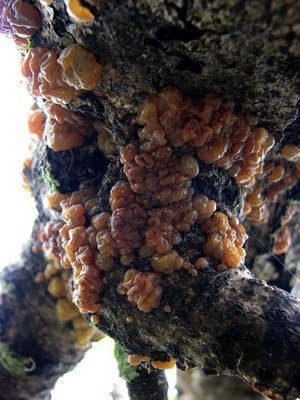Ariel Gordon's Blog, page 80
June 6, 2011
LED
Published on June 06, 2011 06:59
June 5, 2011
Out-of-Town-Authors: Peter Robinson
TAKE IT to the Banks
Popular British detective back in Bad Boy
Winnipeg Free Press - PRINT EDITION
by: Ariel Gordon
British-born but Toronto-based mystery writer Peter Robinson has written 24 books, 19 of which that revolve around Insp. Alan Banks.
 The latest Banks book, Bad Boy, takes its title from The Beatles song of the same name.
The latest Banks book, Bad Boy, takes its title from The Beatles song of the same name.
Peter Robinson will be reading Saturday, June 11, at the Canwest Global Performing Arts Centre at The Forks as a fundraiser for THIN AIR: Winnipeg International Writers Festival.
* * *
1) As a writer (i.e. someone whose artistic practice is predicated on time spent alone) how do you approach performance? What do you get out of it?
Tours and performances help to create a little variety in life. It can be quite lonely and isolating just sitting making things up day in, day out, and one definitely feels the need to get out more and meet one's audience. Events don't always come at the most opportune moments, but you learn to work around them.
Actually, I think it's basically most unreasonable to expect writers -- who often do what they do because they are shy, solitary people -- to entertain audiences as if they were performers. If they wanted to do that, they'd be actors or rock stars. That said, it doesn't bother me very much. I have taught for many years, and if I can keep a class of 30 or so 16-year-olds who'd rather be anywhere else under control, I can certainly enjoy myself with a room full of people who actually want to be there.
2) What do you want people to know about Bad Boy?
That it's a thrilling, exciting read and hard to put down. It's far more of a thriller than a detective novel. You know, a whodunit. It's just a matter of how far he will go. And, of course, there is the relationship between Banks and his daughter to engage the readers' emotions.
3) Will this be your first time in Winnipeg? What have you heard?
I've been to Winnipeg many times and have been careful not to listen to any rumours.
4) What are you reading right now? What are you writing right now?
I'm reading a novel called Blood Harvest by S.J. Bolton and a new history of Russia by Martin Sixsmith. I also have a couple of recent books on Bob Dylan on the go.
5) After 19 books, is there anything about Insp. Alan Banks you don't know? Does he still surprise you?
There's still plenty I don't know about Banks, and when I find it all out there'll be nothing left to write. As long as he is still capable of surprising me, then I know I will be able to keep on writing about him.
Ariel Gordon is a Winnipeg writer.
Popular British detective back in Bad Boy
Winnipeg Free Press - PRINT EDITION
by: Ariel Gordon
British-born but Toronto-based mystery writer Peter Robinson has written 24 books, 19 of which that revolve around Insp. Alan Banks.
 The latest Banks book, Bad Boy, takes its title from The Beatles song of the same name.
The latest Banks book, Bad Boy, takes its title from The Beatles song of the same name.Peter Robinson will be reading Saturday, June 11, at the Canwest Global Performing Arts Centre at The Forks as a fundraiser for THIN AIR: Winnipeg International Writers Festival.
* * *
1) As a writer (i.e. someone whose artistic practice is predicated on time spent alone) how do you approach performance? What do you get out of it?
Tours and performances help to create a little variety in life. It can be quite lonely and isolating just sitting making things up day in, day out, and one definitely feels the need to get out more and meet one's audience. Events don't always come at the most opportune moments, but you learn to work around them.
Actually, I think it's basically most unreasonable to expect writers -- who often do what they do because they are shy, solitary people -- to entertain audiences as if they were performers. If they wanted to do that, they'd be actors or rock stars. That said, it doesn't bother me very much. I have taught for many years, and if I can keep a class of 30 or so 16-year-olds who'd rather be anywhere else under control, I can certainly enjoy myself with a room full of people who actually want to be there.
2) What do you want people to know about Bad Boy?
That it's a thrilling, exciting read and hard to put down. It's far more of a thriller than a detective novel. You know, a whodunit. It's just a matter of how far he will go. And, of course, there is the relationship between Banks and his daughter to engage the readers' emotions.
3) Will this be your first time in Winnipeg? What have you heard?
I've been to Winnipeg many times and have been careful not to listen to any rumours.
4) What are you reading right now? What are you writing right now?
I'm reading a novel called Blood Harvest by S.J. Bolton and a new history of Russia by Martin Sixsmith. I also have a couple of recent books on Bob Dylan on the go.
5) After 19 books, is there anything about Insp. Alan Banks you don't know? Does he still surprise you?
There's still plenty I don't know about Banks, and when I find it all out there'll be nothing left to write. As long as he is still capable of surprising me, then I know I will be able to keep on writing about him.
Ariel Gordon is a Winnipeg writer.
Published on June 05, 2011 21:16
May 30, 2011
filligree
Published on May 30, 2011 12:10
kid leather
Published on May 30, 2011 12:09
sequins
Published on May 30, 2011 12:08
May 29, 2011
Out-of-Town Authors: Madeleine Thien
Novelist turns loss inside out in new book about survivors of Khmer Rouge regime
Winnipeg Free Press - PRINT EDITION
by: Ariel Gordon
Montreal-based writer Madeleine Thien's work has been translated into more than 16 languages. In 2010, Thien received Romania's Ovid Festival Prize, awarded each year to an international writer of promise.
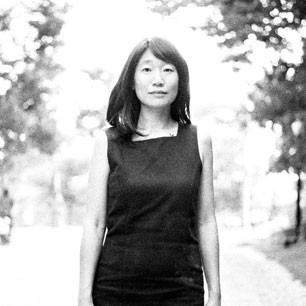 This year sees the release of her second novel, which focuses on survivors of the Khmer Rouge regime in Cambodia.
This year sees the release of her second novel, which focuses on survivors of the Khmer Rouge regime in Cambodia.
Thien will launch Dogs at the Perimeter Monday at McNally Robinson Booksellers.
* * *
1) As a writer (someone whose artistic practice is predicated on time spent alone), how do you approach performance? What do you get out of it?
I've been sifting through the book, reading things aloud, looking for the parts that will speak. By nature, I'm shy, but I've thought so deeply about this novel that I'm incredibly happy to have the chance to introduce it, to talk about it. At the events themselves, I find I learn a great deal from the many conversations that ensue.
2) What do you want people to know about Dogs at the Perimeter?
The Khmer Rouge told people that they were alone, that they were powerless to protect those they loved, that only the regime could save them. My novel is an attempt to confront this atomization, this breakage, and to defy it. Disappearance permeates the book, but disappearance is also turned inside out.
The narrator, Janie, attempts to make sense of the fractures in her life by telling the story of two lost brothers, Hiroji and James Matsui; she disappears into their stories and, in so doing, hopes to survive.
3) Will this be your first time in Winnipeg? What have you heard?
One of the first readings I ever did was in Winnipeg, back in 2001. I love the city (it's where, in 2006, I met my partner, who is also a novelist). Friends have told me that the theatre scene and theatre community are extraordinary.
4) What are you reading right now? What are you writing right now?
I'm reading a truly great reportage, All That We Say is Ours: Guujaaw and the Reawakening of the Haida Nation.
Right now, I'm finishing a long essay on the American mid-Atlantic and South. It's part of an ongoing conversation between myself and seven international writers who were invited to tour the United States in early April.
As I've been writing, the essays of the American novelist James Baldwin have become my northern light. He is both a brilliant and a brave thinker.
5) You've written about the Khmer Rouge regime in Cambodia and the Japanese occupation of Malaysia. How do you keep your research material from overwhelming you?
The research overwhelms. I think it's part of the nature of what I write, what challenges me, and what propels me. For this book, in particular, the more I wrote, the more I saw that a single book could never convey the magnitude of what happened. The Cambodian genocide is so complex, so multi-layered, so tied to other histories, that we need many books.
I tried to write a story that would carry Cambodian history a little further into a wider consciousness. I wanted to create characters who took on a life of their own, who would form a bond of friendship with the reader, and this would be my way of adding to the larger story.
Ariel Gordon is a Winnipeg writer.
Winnipeg Free Press - PRINT EDITION
by: Ariel Gordon
Montreal-based writer Madeleine Thien's work has been translated into more than 16 languages. In 2010, Thien received Romania's Ovid Festival Prize, awarded each year to an international writer of promise.
 This year sees the release of her second novel, which focuses on survivors of the Khmer Rouge regime in Cambodia.
This year sees the release of her second novel, which focuses on survivors of the Khmer Rouge regime in Cambodia.Thien will launch Dogs at the Perimeter Monday at McNally Robinson Booksellers.
* * *
1) As a writer (someone whose artistic practice is predicated on time spent alone), how do you approach performance? What do you get out of it?
I've been sifting through the book, reading things aloud, looking for the parts that will speak. By nature, I'm shy, but I've thought so deeply about this novel that I'm incredibly happy to have the chance to introduce it, to talk about it. At the events themselves, I find I learn a great deal from the many conversations that ensue.
2) What do you want people to know about Dogs at the Perimeter?
The Khmer Rouge told people that they were alone, that they were powerless to protect those they loved, that only the regime could save them. My novel is an attempt to confront this atomization, this breakage, and to defy it. Disappearance permeates the book, but disappearance is also turned inside out.
The narrator, Janie, attempts to make sense of the fractures in her life by telling the story of two lost brothers, Hiroji and James Matsui; she disappears into their stories and, in so doing, hopes to survive.
3) Will this be your first time in Winnipeg? What have you heard?
One of the first readings I ever did was in Winnipeg, back in 2001. I love the city (it's where, in 2006, I met my partner, who is also a novelist). Friends have told me that the theatre scene and theatre community are extraordinary.
4) What are you reading right now? What are you writing right now?
I'm reading a truly great reportage, All That We Say is Ours: Guujaaw and the Reawakening of the Haida Nation.
Right now, I'm finishing a long essay on the American mid-Atlantic and South. It's part of an ongoing conversation between myself and seven international writers who were invited to tour the United States in early April.
As I've been writing, the essays of the American novelist James Baldwin have become my northern light. He is both a brilliant and a brave thinker.
5) You've written about the Khmer Rouge regime in Cambodia and the Japanese occupation of Malaysia. How do you keep your research material from overwhelming you?
The research overwhelms. I think it's part of the nature of what I write, what challenges me, and what propels me. For this book, in particular, the more I wrote, the more I saw that a single book could never convey the magnitude of what happened. The Cambodian genocide is so complex, so multi-layered, so tied to other histories, that we need many books.
I tried to write a story that would carry Cambodian history a little further into a wider consciousness. I wanted to create characters who took on a life of their own, who would form a bond of friendship with the reader, and this would be my way of adding to the larger story.
Ariel Gordon is a Winnipeg writer.
Published on May 29, 2011 21:06
May 27, 2011
Poems/Poms
So last night was Jennifer Still's launch of Girlwood (Brick Books, 2011), her second collection of poems.
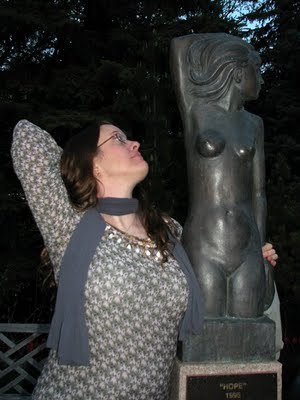 Given the book's mid-seventies vibe, there were hand-made pom poms to go with the poems. And Jenn's mother's roller skates.
Given the book's mid-seventies vibe, there were hand-made pom poms to go with the poems. And Jenn's mother's roller skates.
But Jenn chose to trade the swag-lamp potential of an inside event for the masses of tulips at Assiniboine Park's Leo Mol Sculpture Garden, which if you know anything about Leo Mol you know is ALSO full of naked (bronze) girls.
I was hosting and so hadn't planned to read, but Jenn phoned a few days before and told me I simply HAD to read my poem, Floodlight, which focuses on the Garden. So I did. I mean, when would I ever again have the chance to read THAT poem THERE without being escorted out by park security?
I thought I'd be the worst offender of the evening, given all the nipples in the poem. But I'm happy to say that I was bested (or is that worsted?) by Barb Schott, who very elegantly uttered the c-word...
It was also lovely to see/hear Ottawa (by way of Saskatchewan) poet Sandra Ridley again, reading from her Fallout (Hagios, 2010).
Thanks to the Assiniboine Park Conservancy for letting Jenn (and Barb and Sandra and I) in to play. Thanks too to Jenn for asking me: it was SUCH an honour.
Extra thanks to Abby, the arbitrator of the poms, for giving me an extra pom for the girl.
 Given the book's mid-seventies vibe, there were hand-made pom poms to go with the poems. And Jenn's mother's roller skates.
Given the book's mid-seventies vibe, there were hand-made pom poms to go with the poems. And Jenn's mother's roller skates.But Jenn chose to trade the swag-lamp potential of an inside event for the masses of tulips at Assiniboine Park's Leo Mol Sculpture Garden, which if you know anything about Leo Mol you know is ALSO full of naked (bronze) girls.
I was hosting and so hadn't planned to read, but Jenn phoned a few days before and told me I simply HAD to read my poem, Floodlight, which focuses on the Garden. So I did. I mean, when would I ever again have the chance to read THAT poem THERE without being escorted out by park security?
I thought I'd be the worst offender of the evening, given all the nipples in the poem. But I'm happy to say that I was bested (or is that worsted?) by Barb Schott, who very elegantly uttered the c-word...
It was also lovely to see/hear Ottawa (by way of Saskatchewan) poet Sandra Ridley again, reading from her Fallout (Hagios, 2010).
Thanks to the Assiniboine Park Conservancy for letting Jenn (and Barb and Sandra and I) in to play. Thanks too to Jenn for asking me: it was SUCH an honour.
Extra thanks to Abby, the arbitrator of the poms, for giving me an extra pom for the girl.
Published on May 27, 2011 14:52
May 25, 2011
Out-of-Town-Authors: Roy Miki
Mannequin A MANO: Author Roy Miki
Poet reflects on our obsession with consuming commodities
Winnipeg Free Press - PRINT EDITION
by: Ariel Gordon
Vancouver-based poet Roy Miki has been called a pioneer of the Japanese-Canadian redress movement.
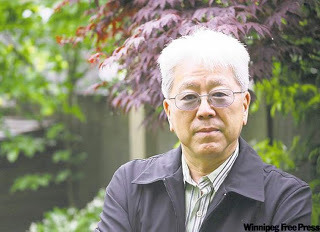 The Governor General's Award-winning writer will launch his fifth collection of poetry, Mannequin Rising, on Friday at Aqua Books.
The Governor General's Award-winning writer will launch his fifth collection of poetry, Mannequin Rising, on Friday at Aqua Books.
His reading is a part of Asian Heritage Month's Asian Canadian Writers Showcase.
* * *
1) As a writer (i.e. someone whose artistic practice is predicated on time spent alone) how do you approach performance? What do you get out of it?
For me, a public reading gives me a more tangible means of experiencing the sound, rhythm, and form of a poem - and getting an immediate response from a reader has always been a revealing moment.
2) What do you want people to know about Mannequin Rising?
My new book comes out of a fairly lengthy period of thinking about the pervasive effects of commodity culture on our daily lives. After the heady days of identity politics, which preoccupied me for many years, I wanted to look more intimately at the implications of our obsession with consuming commodities in all of its forms, even identities.
As I sauntered around my Kitsilano neighbourhood in Vancouver with my digital camera, I found myself attracted to the figures of mannequins in the store windows. I began constructing a series of photocollages that re-situated some mannequins in different landscapes that are part of the neighbourhood, both urban and natural, or the mixing of the two. A series of poems formed in and around the collages, and soon other series, based on Granville Island in Vancouver and Shibuya and Ginza in Tokyo, took shape. These three series formed the basis of the book.
3) Will this be your first time in Winnipeg? What have you heard?
I grew up in Winnipeg. My family was part of the mass uprooting of Japanese Canadians during the 1940s. I've read here on a number of occasions and have had wonderful conversations with writers and readers about current writing.
4) What are you reading right now? What are you writing right now?
I generally read several books at the same time because I have strong interests in both creative and critical thought.
One book I'd like to mention, though, is Rene Rodin's utterly insightful and very beautifully written book Subject to Change, published by Talonbooks. It's a book of stories drawing on luminous personal moments, at the heart of which is a tender and courageous story of her father's passing.
As for my own current writing, I'm working through the final draft of a collection of essays on Asian Canadian writing, called In Flux: Transnational Shifts in Asian Canadian Writing, forthcoming from NeWest Press this fall.
5) Tell me about your work with the Japanese-Canadian redress movement.
As a child of internment I grew up with stories of the mass uprooting, and especially of the injustices suffered by my family because of the racist policies of the federal government. Getting involved in the redress movement was a natural extension of wanting to see the government acknowledge the injustices and negotiate a settlement directly with Japanese Canadians. It was a great honour and privilege to be able to participate in the movement that finally led to an agreement on Sept. 22, 1988.
Ariel Gordon is a Winnipeg writer.
* * *
This article was originally published in the Winnipeg Free Press on Sunday, May 22.
Poet reflects on our obsession with consuming commodities
Winnipeg Free Press - PRINT EDITION
by: Ariel Gordon
Vancouver-based poet Roy Miki has been called a pioneer of the Japanese-Canadian redress movement.
 The Governor General's Award-winning writer will launch his fifth collection of poetry, Mannequin Rising, on Friday at Aqua Books.
The Governor General's Award-winning writer will launch his fifth collection of poetry, Mannequin Rising, on Friday at Aqua Books.His reading is a part of Asian Heritage Month's Asian Canadian Writers Showcase.
* * *
1) As a writer (i.e. someone whose artistic practice is predicated on time spent alone) how do you approach performance? What do you get out of it?
For me, a public reading gives me a more tangible means of experiencing the sound, rhythm, and form of a poem - and getting an immediate response from a reader has always been a revealing moment.
2) What do you want people to know about Mannequin Rising?
My new book comes out of a fairly lengthy period of thinking about the pervasive effects of commodity culture on our daily lives. After the heady days of identity politics, which preoccupied me for many years, I wanted to look more intimately at the implications of our obsession with consuming commodities in all of its forms, even identities.
As I sauntered around my Kitsilano neighbourhood in Vancouver with my digital camera, I found myself attracted to the figures of mannequins in the store windows. I began constructing a series of photocollages that re-situated some mannequins in different landscapes that are part of the neighbourhood, both urban and natural, or the mixing of the two. A series of poems formed in and around the collages, and soon other series, based on Granville Island in Vancouver and Shibuya and Ginza in Tokyo, took shape. These three series formed the basis of the book.
3) Will this be your first time in Winnipeg? What have you heard?
I grew up in Winnipeg. My family was part of the mass uprooting of Japanese Canadians during the 1940s. I've read here on a number of occasions and have had wonderful conversations with writers and readers about current writing.
4) What are you reading right now? What are you writing right now?
I generally read several books at the same time because I have strong interests in both creative and critical thought.
One book I'd like to mention, though, is Rene Rodin's utterly insightful and very beautifully written book Subject to Change, published by Talonbooks. It's a book of stories drawing on luminous personal moments, at the heart of which is a tender and courageous story of her father's passing.
As for my own current writing, I'm working through the final draft of a collection of essays on Asian Canadian writing, called In Flux: Transnational Shifts in Asian Canadian Writing, forthcoming from NeWest Press this fall.
5) Tell me about your work with the Japanese-Canadian redress movement.
As a child of internment I grew up with stories of the mass uprooting, and especially of the injustices suffered by my family because of the racist policies of the federal government. Getting involved in the redress movement was a natural extension of wanting to see the government acknowledge the injustices and negotiate a settlement directly with Japanese Canadians. It was a great honour and privilege to be able to participate in the movement that finally led to an agreement on Sept. 22, 1988.
Ariel Gordon is a Winnipeg writer.
* * *
This article was originally published in the Winnipeg Free Press on Sunday, May 22.
Published on May 25, 2011 08:26
May 23, 2011
This THURSDAY
GIRLWOOD IN THE GARDEN
an evening of poems, blossoms and pompoms!
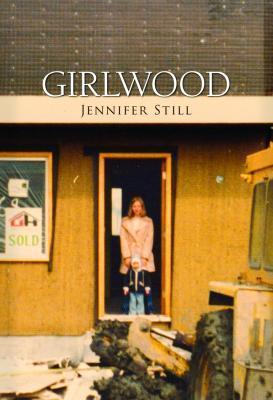 Come wander the figures (and figuratives) of Jennifer Still's latest collection.
Come wander the figures (and figuratives) of Jennifer Still's latest collection.
Thursday, May 26, 7pm to dusk.
Leo Mol Sculpture Garden, Assiniboine Park (near the gazing pond, somewhere between
"Torso of Balance" and "Girl with Pigtails")
FREE ADMISSION
"Crimson and Clover" readings by special guests Sandra Ridley, (Fallout, Hagios Press) and Barbara Schott, (Memoirs of an Almost Expedition, Brick Books).
"Girls Just Want to Have Fun" hosting by award-winning poet Ariel Gordon.
*Launch special: A set of handmade poms with every sale of poems!*
Catering by Terrace Fifty-Five.
In the event of rain, readings will take place in the garden gallery.
an evening of poems, blossoms and pompoms!
 Come wander the figures (and figuratives) of Jennifer Still's latest collection.
Come wander the figures (and figuratives) of Jennifer Still's latest collection.Thursday, May 26, 7pm to dusk.
Leo Mol Sculpture Garden, Assiniboine Park (near the gazing pond, somewhere between
"Torso of Balance" and "Girl with Pigtails")
FREE ADMISSION
"Crimson and Clover" readings by special guests Sandra Ridley, (Fallout, Hagios Press) and Barbara Schott, (Memoirs of an Almost Expedition, Brick Books).
"Girls Just Want to Have Fun" hosting by award-winning poet Ariel Gordon.
*Launch special: A set of handmade poms with every sale of poems!*
Catering by Terrace Fifty-Five.
In the event of rain, readings will take place in the garden gallery.
Published on May 23, 2011 16:51
smear
Published on May 23, 2011 12:35





